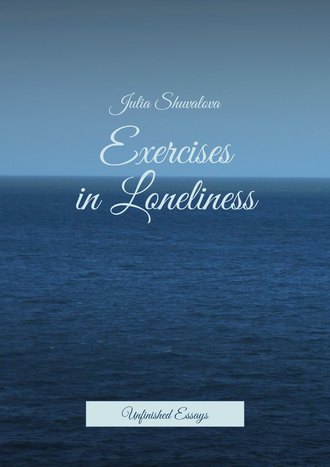
Полная версия
Exercises in Loneliness. Unfinished Essays
I read a lot in a few languages, and I always find it amusing when authors try to jam every possible bit of information into their narrative. Laconism is a dangerous thing because, as Balzac said, it is like a lightning that blinds you and you no longer know where it leads you. But the so-called intellectual literature, as practised by the authors less potent than Eco or Vargas Llosa, sometimes resembles a Kunstkammer that terrifies you with its sheer size, not to mention the content. I have read a few 700-odd page novels recently, and I felt each one could be at least two times shorter. Today a commercial purpose also dictates to serialise stories, yet some novels that were awarded the Nobel Prize don’t exceed 300 pages. The impression the latter make, however, is usually indelible.
The art of writing consists in finding the form to best shape and project the content. Like in silent film they used to move camera and change lighting to tell the story visually, so a writer should, too, use the language and its means to produce precise descriptions without falling into verbosity. I do believe that a writer and a film director are rather similar. Both are creators who should be stifled – in a good sense – by their art, if not budget or word count, to produce a work that expresses their ideas, while using the methods of each respective art to their full potential. Just as you don’t need too much money to make an epic film, so you don’t need too many pages to compose a good novel.
In Quignard’s work every scene and every word are in their proper place. Laconism and precision produce a remarkably rich, detailed narrative. There is no thoroughness that makes you feel the author is trying to reach the word count. No long-windedness, walking in circles or constant repetitions. Instead of a cluttered text there is a virtuoso incarnation of a writer’s idea that has obtained a perfect shape and now flows effortlessly, like some of the best improvisations. Such is the music of Mr. Quignard.
4
I’m sitting at Cornerhouse in Manchester, on the first floor. There aren’t many people there yet, and I am fortunate to find myself by the window in the farthest corner. People are eating, or drinking, and chatting, and at the next table to mine sit two Spanish girls, in similar clothes, with laptops.
It’s almost seven o’clock. Going to work in the morning happens pretty quickly, or so it seems, perhaps because I’m in a hurry. But in the evening homecoming takes ages. In truth, it takes probably just a little bit longer than in the morning – about 20 minutes longer – but somehow I’m conscious of this difference.
And so, I’m sitting here, writing this, and the tea in a delicate glass cup is still fairly hot but will get colder by the time I finish writing.
What is it that I wanted to say? I came here with the intent to carry on with my musings on self-identification and categorisation. I spent the most fulfilling half an hour on the train spilling the words out on the lined pages of a reporter’s notebook where I’m now continuing with this. Henry Miller – and with him many a writer – would call this a “dictation”. It’s this wonderful state of things when you feel yourself as a tool in someone’s hands who is sitting somewhere afar and whispering these words into the tip of the tool, and they pass at the speed of light to land in your head to be heard and discovered.
Конец ознакомительного фрагмента.
Текст предоставлен ООО «ЛитРес».
Прочитайте эту книгу целиком, купив полную легальную версию на ЛитРес.
Безопасно оплатить книгу можно банковской картой Visa, MasterCard, Maestro, со счета мобильного телефона, с платежного терминала, в салоне МТС или Связной, через PayPal, WebMoney, Яндекс.Деньги, QIWI Кошелек, бонусными картами или другим удобным Вам способом.


